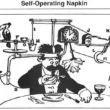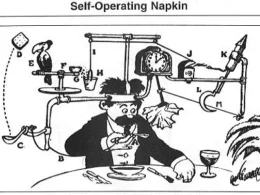Short-side stock manipulators are slippery and, by definition, dishonest. These people thrive on the internet, where they can anonymously spread misinformation and then away, with little fear of being held accountable. Still, on a few occasions, I’ve observed anonymous defenders of illegal naked short selling attempt to mount a philosophical defense of their actions. When they do, the best case they can make sounds like this:
“America’s capital markets are too large and complex for our regulators to handle. As a result, overvalued, scamming companies run rampant, defrauding investors. We, the naked short sellers, are doing the rest of you a favor by taking the law into our own hands in an effort to short these companies out of existence, or at the very least depress their share prices such that when they finally do fail, the rest of you will not lose as much as you would have. So you’re welcome.”
This silly idea is taken directly from anarcho-capitalism: an economic and political philosophy describing how market participants themselves, operating in the absence of government regulation, might find a profit motive in the maintenance of order.
To be fair, these “principled” naked short sellers and I do in fact agree on one matter: the fact that our markets are operating without an effective regulator. And I’ll also concede that there was a time when the rest of this anarcho-capitalist manifesto might have applied; specifically, many years ago, when manipulative short sellers limited their activities to micro-cap companies that were expert at selling: not goods or services, but stock. And because the world of penny stocks is recognized by all as a financial Wild West to begin with, this form of frontier justice – though distasteful – was allowed to fill a niche in the great financial ecosystem…akin to the fleas biting the rats feeding on the scraps fallen from the table of American capitalism. Then, for reasons too complicated to fully explain here, following the market crash of 1987, predatory short selling began to move from the shadowy back alleys and onto Wall Street, where, within less than two decades, these parasites had moved far up the food chain, never quite able to satisfy their blood-lust, while regulators continued looking the other way.
I offer all this information as background, in order to help you more fully appreciate what follows.
Last month, the Deep Capture team began to spot patterns in the equities and options trading of companies whose stock experienced unusually high levels of sustained delivery failures: a sure sign of manipulative naked short selling. We determined that certain pairs of transactions (what we’ve come to call “matched blocks”) faithfully predicted the numbers of shares that would go on to be reported as undelivered by the seller two trading days later. Because delivery is only considered “failed” after three trading days (T+3), and these transactions were taking place on T+1, we realized that they must be happening in response to the naked shorts generated on T+0; specifically, that these trades are likely intended to give the appearance that the SEC’s mandatory close-out requirement has been met, thus “resetting” the three-day clock ticking down until delivery is forced.
This sort of thing is not supposed to be happening, by the way. It’s illegal, and, under significant political pressure, last year the SEC lightly reproached three other firms for engaging in identical activity.
Whatever the case, these matched blocks, which we can observe in near-real time, proved uncanny predictors of failed trades reported by the SEC in much-less-than-real-time (usually delayed by two to three weeks). We took advantage of this reporting time lag to publicly predict – based on the matched blocks – delivery failures in shares of Sears Holdings (NASDAQ:SHLD) several days before those figures were released. When they finally were, our predictions proved accurate to within 2.5% — including faithfully anticipating a near 50% drop from one day to the next.
After publishing these predictions for Sears, I posted messages alerting readers of stock message boards dedicated to discussing Amedysis (NASDAQ:AMED) and Mannkind Corp. (NASDAQ:MNKD): two other companies whose trading data demonstrated links between matched blocks and delivery failures nearly identical to that of Sears, and where many posters were attempting to understand – though with only fragmentary information – what was going on.
All along, it was my intention, upon finishing my analysis of apparent manipulation in Sears, to raise awareness of the same sort of activity in Amedysis and Mannkind; however I never really had the chance, because it appears the would-be manipulator got spooked by the attention and decided to move on, covering at what was almost certainly a hefty loss.
In fact, the similarities observed in the trading of these three stocks from unrelated sectors (a brick-and-mortar retailer, a biotech firm and a provider of home health care), is somewhere between striking and spooky. In each case, the volume of the matched blocks reached their peaks on February 17 (the date of publication of my Sears prediction), and then abruptly tapered off. By March 2, Mannkind was off the Threshold list. By March 3, Sears Holdings was off the Threshold list. By March 22, Amedysis was also off the list.
It’s impossible to be certain whether the attention brought by Deep Capture had anything to do with the sudden abandonment of what had been a concerted effort at downward manipulation of the stock prices of three decidedly non-scam companies; yet the coincidences are too many to be ignored (there are others, by the way).
The idea that we might have had something to do with helping to restore fairness to the markets for these stocks, combined with my remembrances of the so-called anarcho-capitalist ideal described above, got me thinking about a new way of approaching this blog:
Because our financial markets are so large and complex, and our financial markets regulator so captured and inept, stock manipulating hedge funds have been running rampant, damaging companies and defrauding investors. We, the investigative bloggers, are stepping in to do the job the SEC either cannot or will not do, by shining a bright light on acts of manipulation when we see them, and publicly identifying the perpetrators (yes, we’ve figured out ways to potentially accomplish this, as well) when able. And we’ll continue doing it, until either America’s stock settlement system is repaired, or the SEC returns from its several decades-long coffee break.
That’s right. The naked short sellers offer anarcho-capitalism, and DeepCapture.com responds by giving them a dose of anarcho-regulation.








Judd — thanks for keeping up the good fight. Its unfortunate that those in a position to manipulate the markets for personal gain continue to do so largely b/c of their selfish need to live a life that is undeserved and excessive. Its a shame b/c more people are losing faith in the market which can work but largely does not b/c of opportunistic parasites. Keep them honest!
There may indeed be a correlation between your expose and the easing of the threshold status of the 3 stocks.
However, in the case of MNKD, a perusal of the yahoo board for that stock reveals an inordinate number of paid bashers with indications that shorts are unrelentingly pumping venom and praying for gangrene to set in.
When will this stop?
Not to harp on MNKD, for it is merely one poster child of malfeasance and manipulation, but rumour had it that a firm in Houston TX was/is behind much of the egregious action.
Any idea?
Some of the biggest naked shorts are pump and dumpers. The scammers naked short their own deals at the high point, then all the way back down.
The parasite’s claim that they are saving us is hooey.
Hurrah for your new mission to bring measures of justice, law and order to the Dodge City of financial markets – the U. S. I have no doubt that you will be the difference between success and destruction for more than one company in the months ahead.
Again, the litany and hosannas of the most holy shortsellers are sung by the pedophilic priests:
http://www.businessweek.com/news/2010-03-30/sec-let-politics-drive-decision-on-short-sale-curbs-sirri-says.html
The price of all stocks (even microcaps) should be determined by the “biggest fool”. The existing rules were put in place to make it so. When the regulators decide to sabotage the markets by not enforcing the rules for certain participants they are guilty of conspiracy to commit fraud. Everyone reading this probably has better things to do than investigate the malfeasance of those regulators who refuse to their jobs. The DOJ should be looking at them thru a RICO lens.
Judd,
You need to do some research on this Harry Markopolos fellow. I smell something fishy with him. If you read his book he is white washing some characters, and David Einhorn doing the introduction?
I, for one, won’t buy Markopolous’ book after he shot himself in the foot with the Einhorn-as-Moses routine in writing the foreward…
I disagree. While I, too, was surprised to see David Einhorn pen the foreword, I don’t think less of Markopolos for it. Our focus is not his, so I would not expect him to view things quite the way we do (should he question our commitment to market reform simply because DeepCapture.com doesn’t address the crime of market timing?). Plus, there aren’t too many people subject to the SEC’s regulatory whims willing to openly attack the Commission. Einhorn is probably one of the most recognizable people who will. In my opinion, Markopolos is in the trenches with us, though on a different part of the front. His book is excellent and everybody should read it (and I’ll have more to say about that in my review of the book, to be posted here in a couple of days).
I’d like to see Einhorn’s artificial halo knocked off, not polished.
“Justice Dept. Eyes Hedgers’ Euro Trashing
Thursday, March 04, 2010 2:52 PM
(Source: The New York Post)By Mark DeCambre
The US Justice Department has launched an investigation into whether a group of hedge fund maestros colluded to place massive bets against the euro.
The probe centers on whether funds run by David Einhorn’s Greenlight Capital, George Soros’ Soros Fund Management, Steve Cohen’s SAC Capital and John Paulson’s Paulson & Co. conspired to help push the value of the euro down during “idea meetings” ” ….
read the rest @
http://www.istockanalyst.com/article/viewiStockNews/articleid/3920313
of interest concerning current media reports is it’s a doj investigation, not the sec!
I see people posting interesting stories about certain stocks and I thought this one might peak some interset since it has beehn mention here on a few occasions..
CMKX story finally in print:
http://www.examiner.com/x-9341-Manhattan-Headlines-Examiner~y2010m3d30-CMKM-Diamonds-and-the-387-trillion-lawsuit-you-didnt-hear-about?cid=edition-rss-New_York
The problem is that there has never been any proof that naked short-selling either exists or is harmful. According to the SEC itself delivery failures aren’t evidence of market manpiulation. Even so unless a company is trying to raise capitalthough the equity markets, its irrelevant to an investor if the stock is artifically low for a period of time. In fact, a company that had excess cash-flow could take advantage of the artifically low price, and execute a massive share buy back that would benefit shareholders.
Its not a coincidence that many of the companies that complain about naked shorting the loudest, CKM, Universal Express, Overstock, are involved in some sort of fraudulent activity. You never hear about someone naked shorting an E-Bay or a Microsoft. When CBOT has its IPO later this year, guess what? No one will be talking about them being “naked shorted”, either.
It appears that cries of “naked shorting” are meant to distract investors from a managment’s poor performance or fraud. Really the SEC should be looking into how to stop naked shortings most famous opponent throwing investors money into an incinerator as opposed to investigating claims that his stock is being manipulated.
Greenday, you’re fun to have around, in the same way it’s fun to watch reruns of old TV shows that once reflected the leading edge of culture, but now seem humorously dated. I recently felt that watching an early episode of Friends. Your comment is the prefect distillation of the Wall Street party line circa 2005, and just left me feeling a combination of nostalgia (as that was the year I first got involved with this issue) and deep appreciation for how far we’ve come since then.
Hi there! I know this is kinda off topic but I was wondering if you knew where I could get a captcha plugin for my comment
form? I’m using the same blog platform as yours and I’m having difficulty finding one?
Thanks a lot!